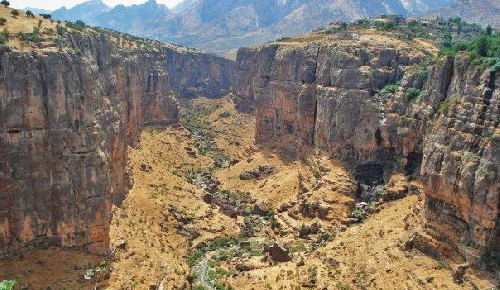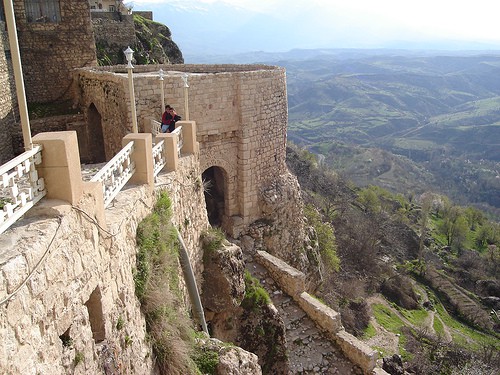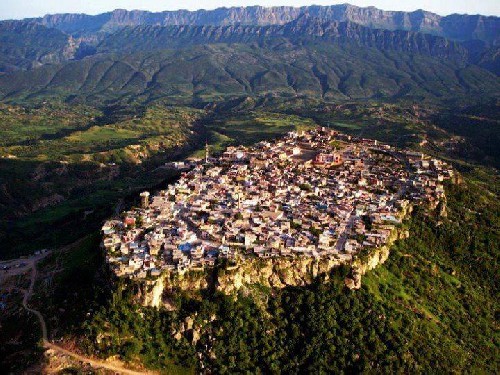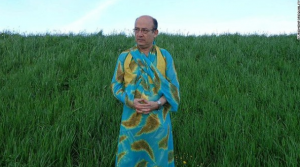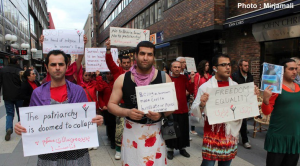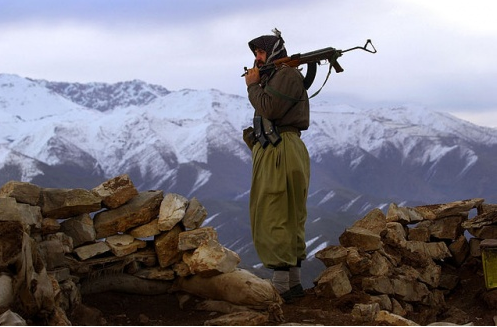The Arab world’s Kurdish population has always sparked my interest. Before I knew much about the ethnicity I always thought them to be mysteriously reclusive. I did know, however, that they did suffer violent acts against the nations in which the population lived within, although I do not believe I knew the exact nations the ethnicity lived in. When searching for my blog’s topic I stumbled upon a mini-documentary created by Vice News. Vice’s mini-documentary that ignited my interest and became the deciding factor for the topic of my blog is titled “Female Fighters of Kurdistan.” Even though the documentary focused on the guerrilla group Free Life for Kurdistan Party (PJAK) the beginning of the documentary gave an excellent over cap of the whole Kurdish ethnicity’s existence. As Vice news said it, “The Kurds are mountain folk who live in the overlap between Iraq, Syria, Turkey and Iran, but don’t really belong to any of them. The Kurdish goal for the last century or so has been to carve up a homeland for themselves, a greater Kurdistan. Which they’ve gone about the traditional way by forming guerrilla armies, blowing up a bunch of carp, and generally making trouble for the countries territory they consider their own.” The Vice quote best summarizes my semester long study in whole. Through my final blog entry use the five political perspectives to analyze the Kurdish ethnicity’s beliefs, their history (starting from about a century ago when they were divided between four nations), the Kurd’s past and present relationships with the nations they live within and the international state actors who play a role in their existence. I will end my retrospective over this semester’s blog with what I have learned and my opinion on the Kurdish question of statehood.
Through the accumulation of information I extracted from articles about the Kurdish ethnicity I found that the Kurd’s are not a religion, but rather an ethnicity. They allow their ethnicity’s individuals to be any religion they please to be. The Kurdish population is approximately 30 million people and tends to be claimed as the largest ethnic group in the world lacking an autonomous state. A majority of the Kurdish ethnicity, primarily the guerilla groups PKK and PJAK, follow the Maoism-inspired ideology created by Apo, called Apoism. The Apoism ideology promotes gender equality and guerrilla warfare. As one could see when studying the Kurdish ethnicity, their movements, and their organizations many uphold Apoism to varying degrees. In comparison to the rest of the Middle East their ideologies, especially gender equality, is extremely unusual.
Kurdistan was divided between four nations (Iran, Iraq, Syria, and Turkey) preceding the end of World War I when the western allies carved up the Arab world and deemed it the Middle East. This division of the Arab world, infamously known to be caused by the allies’ Sykes-Picot Agreement, in which duped Arab leaders into giving the Western nations colonies in the Arab world to where they could develop and extract resources. This caused a theme of radicalism to be placed within the mindset of Arabs and other ethnicities within the Arab world. However, the Kurdish population, even though they were divided between four nations due to the West’s imperialist efforts, tends to be more pro-Western, which is also extremely unusual for the Middle East.
Kurdistan’s territory is mountainous and contains a great deal of oil throughout the region. Developing the Kurd’s oil holds a great point of contention between the Kurds and the nation that they with within. Because of the potential boost in economy the Kurd’s oil could provide to the given nation, these nations are reluctant to let the Kurd’s gain statehood. Due to the Kurdish oil, the population’s rights and freedoms are restricted in many of the countries they inhabit. The Kurd’s have even endured genocidal attempts, such as the Iraqi Kurds did under Saddam Hussein’s regime in the 1980s. However, Saddam Hussein’s massive onslaught of Iraqi Kurds could have been due to the Iraqi Kurd’s then alliance with Iraq’s enemy Iran. Whatever the underlying cause may have been, whether if it is the former, the latter, or both the Kurdish population, no matter what nation they have lived with in has suffered from violence, and oppression. State leadership, military intervention, and the economy, the motifs of a political realist perspective, seems to be the overall trend between the Kurdish and the relationships they have with the varying nations they inhabit. However, depending on the nation, the divided Kurdish populations all fight a different battle.
The Iranian Kurds, are known to be subject to imprisonment if found to be involved with in a Kurdish organization or Kurdish political party. Iran over the course of the relationship has gone back and forth on this restriction depending on the state of the Iranian-Kurd relationship at the given time. In my blog I featured a cosmopolitan controversy that occurred between the local Iranian government and the Kurdish city of Marivan in April 2014. The controversy began when the local Iranian government subjected a criminal to a punishment that forced him to be escorted around the city parading a Kurdish woman’s attire. The cosmopolitan political perspective suggests that networks, including social media, bring rise to new political actors, that being social network users. The cosmopolitan perspective was seen at work in this controversy. After the criminal was paraded around the city, there was an outcry within the city’s population against the punishment. Men began to post pictures online of themselves dressed in Kurdish women clothing and holding signs with gender equality rhetoric as protest. Even though the Iranian government still issued the punishment thereafter, international spectators had knowledge of the controversy and the unusual and offensive cruelties the Iranian government placed on the Kurds.
Further, Syrian Kurds are unable to obtain Syrian citizenship. Conversely, since the Syrian civil war broke out, the Assad regime has been willing to grant citizenship to their Kurdish population if and only if they support the Assad regime. Due to Assad’s communication, attempt to network and his reliance on the Kurds, a non-state actor, to support his regime, one could conclude that this is a cosmopolitan political controversy.
Turkey, has also subjected the Kurdish population to oppressive measures, similar to those of Iran and Syria’s. However, Turkey, unlike Iran and Syria, has greater ties with international actors, including the west. Turkey’s strong ties with the west have influenced the international perspective to be akin with theirs when concerning Kurdish militias. The Kurds have been in conflict with Turkey for the past 30 years due to the Kurdish guerrilla group, PKK. The PKK promotes violence, especially against the Turkish government. Because of the conflicting relationship Turkey tends to categorize all Kurdish militias under the terrorist umbrella. Recently, Kurdish militias, not involved with the PKK, suffered great losses during the IS insurgency in the Kurdish territories of Northern Iraq and Syria. During IS’ siege of the Syrian city Kobane, Turkey halted the US-aided Iraqi Kurdish group, Peshmerga, from delivering aid to the city. This is due to Turkey’s skepticism over Syria’s Kurdish militia YPG. Despite IS’ success in Kobane, the US would not provide aid to any other Kurdish militia because of Turkey skepticism. This controversy is one of political liberalism due to nations’ skepticism over intervening and providing aid to the Kurdish militias. The controversy could also be argued to be one of a political realist perspective, because of the influence Turkey and the US have on each other and the control they have over each other’s activities.
Lastly, Iraqi Kurds, under Saddam Hussein’s regime has endured genocide as I previously stated. On the contrary, Iraqi Kurds have also had the most success in formulating its own sovereign state, thanks to help from the United States. During the 1980s and during George W. Bush’s war against terror the Kurdish militia, Peshmerga, provided the US with intelligence and the US provide the Kurds with protection, aid and a semi-autonomous state. One could consider the Iraqi Kurds‘ formation of a political identity through the aid of the US from a political liberalist’s perspective on globalization due to its multilateral dynamics.
As I studied the dynamics of the Kurdish population and their variety of relationships I began to speculate on whether statehood is within the view. Because there are so many different adversaries against the Kurdish population it maybe difficult for them to become a single and unified Kurdistan all at the same time. Rather the formation of a unified Kurdistan will formulate through a matter of steps. I believe that the Iraqi and Syrian Kurds have the most chance at becoming an autonomous state due to their nation’s failures. Unfortunately, I believe the Kurds of Iran and Turkey will face stronger forces against their pursuit for autonomy due to their nations’ strong leadership.
-Natalie


